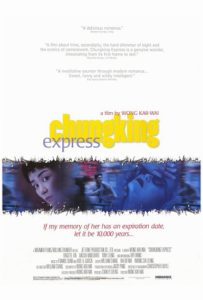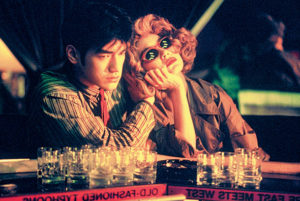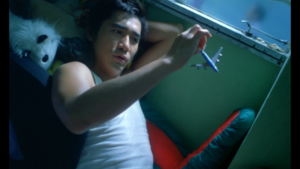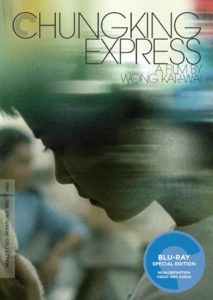Chungking Express
Screenplay: Wong Kar-Wai
Minutes: 102
Year: 1994
Score: 9.50
Release: Criterion Collection
“Where do you want go?” “Doesn’t matter. Wherever you want to take me.” Chungking Express is love. It is messy, sad, manic, lonely, effervescent, dangerous, and enthralling.
From Criteron.com:
The whiplash, double-pronged Chungking Express is one of the defining works of nineties cinema and the film that made Hong Kong filmmaker Wong Kar-wai an instant icon. Two heartsick Hong Kong cops (Takeshi Kaneshiro and Tony Leung), both jilted by ex-lovers, cross paths at the Midnight Express take-out restaurant stand, where the ethereal pixie waitress Faye (Faye Wong) works. Anything goes in Wong’s gloriously shot and utterly unexpected charmer, which cemented the sex appeal of its gorgeous stars and forever turned canned pineapple and the Mamas and the Papas’ “California Dreamin’” into tokens of romantic longing.
Chungking Express is a perfect example of a movie that I watched then, when sitting back as the end credits start to roll, I hated myself for not seeing  sooner. I have forgiven myself, but I didn’t want to. I watched it for the first time two years ago and about five times since then. Each screening scores higher and higher to the point that I may never rate it again.
sooner. I have forgiven myself, but I didn’t want to. I watched it for the first time two years ago and about five times since then. Each screening scores higher and higher to the point that I may never rate it again.
Occasionally you will find a film by a director who decides that he needs to take a break from the making of a massive movie to throw together a little something as a distraction. Chungking Express was the distraction; a pet project which elevated the director into the cinephilia stratosphere when Quentin Tarantino signed the film to his short-lived distribution company and brought the film, and director Wong Kar-Wai, to the United States.
I don’t know if I was feeling lonely or nostalgic when I first watched the film, but it hit me, and it hit me hard. Tony Leung and Faye Wong will make anyone believe that love is nothing short of magic and will leave you satiated and longing, both in the same breath. Whether lonely or nostalgic on that first viewing, the subsequent screenings were not also clouded, and there was no luster lost.
Let’s look at the first story. This is an unlikely pairing of a gentleman police officer with a penchant for expiring pineapple and a mortified criminal with some bad sardines. The woman in the blonde wig knows her time is up after a failed drug deal and the lonely police officer, who is struggling through a breakup on an obsessive level, meet up for an evening of drinking and end it with an unconventional evening together.
Wong Kar-wai uses a series a blurry jump-cuts to illustrate the confusion of the action scenes. While this probably was a way to decrease the filming cost it helps to mold the experience for the audience; as innocent bystanders are rarely able to see every aspect of the incidents around them; Wong delivers a realistic experience. On first watch it is a little off-putting, but as more scenes play out and you start to acclimate yourself to them, they feel right. 
The second story is where my mind wanders whenever I hear The Mamas and The Papas or The Cranberries. The second story is one of the places to where my mind wanders when I need to think of joy.
Tony Leung and Faye Wong play the types of characters that I would hope would be in a relationship after the filming is done. Their chemistry is special, and I want to challenge you to not fall in love with them. Leung is a police officer whose girlfriend leaves him after she learns that while complacency is comfortable there are other options. Wong highlights this with food. Leung brings a chef’s salad home, each night, for his girlfriend’s dinner. Then the owner of the snack shop convinces him that she might want to try something different, and Leung, called 663, takes her some fish and chips.
Faye Wong’s character is a slightly manic, young, woman who is still trying to figure out what she wants out of life. She gets a job at her cousin’s snack shop, the one with the good chef’s salad, to save up money to travel to California to try a different life.
While Faye is technically breaking and entering, she is doing what she thinks is right when she uses a returned key to go to 663’s apartment to clean it and spruce things up after 663 offers to have her, “drop by sometime.” Though, this is not, likely, what he meant.
 To keep some consistency between the two stories, Wong maintains his use of the jump cuts, but rather than using it to accentuate the intense action, he uses it to slow down moments of isolation and loneliness. It is an incredibly effective tool when you see 663 taking ten seconds to drop a quarter in a jukebox while the action behind him appears to continue at a normal pace.
To keep some consistency between the two stories, Wong maintains his use of the jump cuts, but rather than using it to accentuate the intense action, he uses it to slow down moments of isolation and loneliness. It is an incredibly effective tool when you see 663 taking ten seconds to drop a quarter in a jukebox while the action behind him appears to continue at a normal pace.
Some of my favorite moments are when Leung passes his own emotions onto various household sundries; a bar of soap thinning out, a wash rag weeping. These moments highlight his loneliness and give Faye’s B & E activities a juxtaposition in which we see her actively improving 663 without his apparent notice. Passive changes that love affects because it needs to, not because it wants to.
It is worth mentioning that essays, or reviews, written by a smitten lover of the film may firmly fall into the “your mileage may vary” category. This film is nearly perfect in my eyes. I watched it with the Lady of the House last night. She liked it but will not likely hold it in the same regard as I do. But, what I explained before spinning up the disc, her opinion does not affect mine. One of the reasons why I am a film lover is that there are no right answers, nor are there wrong ones. In the same weekend I can go from watching Chungking Express, which I just called perfect, and then watch a Herschell Gordon Lewis’s Blood Feast and love it for its imperfections. Be that as it may, however, Faye and Cop 663 are on the same level as other historical lovers.
The bad news is that this is currently out of print, on physical media, but, as of 8-29-2017, is available to stream on The Criterion Channel on Filmstruck. There are rumors of it coming back in print, but those are rumors. If you have a chance to watch this movie you absolutely should. As of this writing, Chungking Express sits at number two on my Top 25. Its score of 9.5 puts it nearly 4 points over the average. Only two out of 880 rated films are over 9. Chungking Express is a rare treasure and deserves a spot on any film lover’s shelf, maybe every shelf, film lover or not.
Special Features
- New, restored high-definition digital transfer, with Dolby Digital 5.1 soundtrack (DVD edition) and DTS-HD Master Audio 5.1 soundtrack (Blu-ray edition) supervised by director Wong Kar-wai
- Remastered Dolby Digital 5.1 soundtrack supervised by director Wong Kar-wai
- Audio commentary by noted Asian cinema critic Tony Rayns
- S. theatrical trailer
- Episode excerpt from the BBC Television series Moving Pictures, featuring Wong and cinematographer Christopher Doyle
- New and improved English subtitle translation
- PLUS: A booklet featuring a new essay by critic Amy Taubin
Director: 10 – Cinematography: 10 – Edit: 10 – Parity: 9 – Main performance: 10 – Else performance: 7 – Score: 10 – Sound: 9 – Story: 10 – Script: 10 – Effects: NA – Design: 9 – Costumes: 9 – Keeps interest: 10 – Lasting: 10
